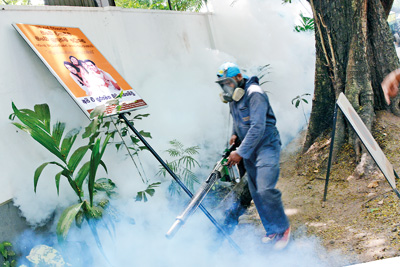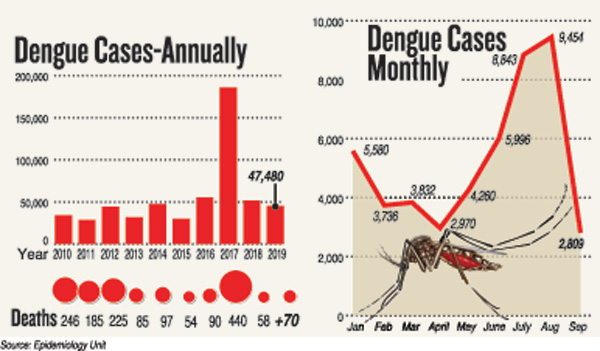News
South-west monsoon main reason behind rise in dengue cases
The dengue epidemic is raging mainly due to the current south-west monsoon, health officials have warned.

Potential mosquito breeding grounds were mainly detected in schools and constructions sites
The National Dengue Control Unit (NDCU) says most cases have been reported from Colombo, Gampaha, Kalutara, Galle, Ratnapura and Kandy districts.
According to NDCU figures as of September 20, there were 45,000 cases this year with 70 deaths.
NDCU Director, Anura Jayasekara told The Sunday Times that generally during July and August there was a risk of dengue cases increasing, however this year the time period had gone on for another month.
Moreover, he said that due to the prevailing weather conditions the number of cases was expected to increase in the coming weeks.
Dr. Jayasekara said one of the main problems was the poor response of the people.
“Programmes are being conducted to increase public awareness, whereby the number of breeding places can be reduced, but without the support of the people this cannot be achieved,” he said.
Gampaha regional epidemiologist and health services director, Krishantha Samaraweera said that as of September 20, about 9,800 dengue cases had been reported with 20 deaths.
According to Dr. Samaraweera figures this year have drastically escalated in comparison to last year, when 6,700 cases were recorded with four deaths.
The regional director has identified Biyagama, Negombo and Katana as high risk areas.
“We have deployed around 200 dengue control field officers who visit houses on a daily basis, apart from the tri-forces programmes organised by the NDCU,” he said.
Dr. Samaraweera said during their cleaning programmes potential mosquito breeding grounds were mainly detected in schools and constructions sites.
Moreover, he also pointed out the lack of support from the people.
“People are only supportive during the peak period when damage has already been done. They should be made aware of the importance of sustaining the practice of eliminating breeding grounds.”
Dr. U.I. Ratnayake the Regional Director of Health Services of Kalutara told the Sunday Times that despite the reduction in the number of dengue cases this year in comparison to last year, the number of cases reported during the past two weeks had escalated.
According to him, as of September 20, 3,000 dengue cases had been reported and they have identified Panadura, Wadduwa, Dodangoda, Mathugama and Bulathsinhala as high risk areas.
“The prevailing rains set out the environmental conditions for dengue mosquitoes to breed and this can only be eliminated if the people’s response was much stronger,” he said.
| Malaria returns: 32 cases reported in past two weeks | |
| Health officials have warned of a possible revival of malaria in Sri Lanka. Anti-Malaria Campaign Director H.D.B. Herath told the Sunday Times that, as of August 27 this year there were only 21 cases which is generally the number of cases for eight months. However, the alarming situation was brought to attention when the total number of patients rose to 32 within two weeks. He said if immediate medication was not taken this could result in death as a number of cases were of cerebral malaria which affects the brain of the patient and resulted in neurological complications. “When we eliminated malaria in 2012 a number of cases were reported from the North and the East and other highly peripheral areas. However now the situation has changed, as many cases have been reported from the Sabaragamuwa, Central Southern and Western provinces,” he said. Dr. Herath said that a large number of malaria cases were reported from the Gampaha district. Accordingly, reports from the Anti-Malaria Campaign stated that in 2017, 56 cases were reported, while in 2018 48 cases were reported, out of which 47 of them were imported cases of malaria. They believe there was only one case of a local transmission. He believes that the reason for the revival of malaria in the country is due to the fact that many individuals travel back and forth on a daily basis, and are not aware whether or not they are malaria endemic countries. “Many of them travel to malaria endemic countries and get infected by the parasite unknowingly and bring it into the country, whereby the parasite matures in the blood steam and gets into the mosquito which in turn spreads the disease,” he explained. The Anti-Malaria Campaign has brought to the attention of the people that there are preventive treatments which they could receive before traveling overseas to prevent the disease from spreading. “We are not telling people to stay indoors always to avoid mosquito bites, but we urge them to use practical methods to prevent exposure to mosquito bites, for instances like using a mosquito repellent,” Dr. Herath said. |

